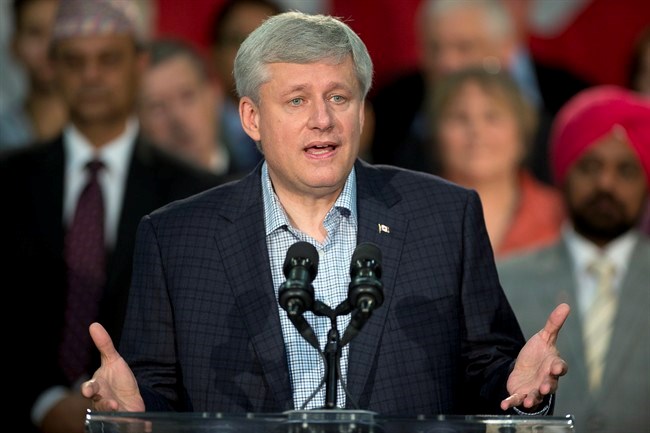VICTORIAVILLE, Que. — Midway through a marathon campaign, the Conservatives are talking like the distance runner who’s plotting and pacing for a late outside-track move into the lead.
Conservative Leader Stephen Harper had one of the most challenging weeks of the election, with accusations of insensitivity on the Syrian refugee crisis, the ouster of two embarrassing candidates and griping from nervous and unhappy party activists.
His campaign was forced into a defensive posture, which appeared to siphon away the time usually spent trying to shape the narrative of the election. By Thursday, Harper had promised concrete measures would be forthcoming to speed up the intake of refugees.
Candidates, campaign strategists and Harper himself emphasize that restless voters will now begin visualizing either Liberal Leader Justin Trudeau or the NDP’s Tom Mulcair as prime minister — and theoretically decide the risk is too big.
“You know, maybe you’d like to change houses. Does that mean you go out and buy swampland?” Harper said Thursday during a campaign stop in Saint John, N.B.
“Swampland — that is what their national plan for runaway spending, taxes and debt is. When it happens, all of its citizens lose, and the country’s citizens lose for a very long time.”
The aggressive incumbent-as-underdog move has worked before — in Alberta with former PC premier Alison Redford, in B.C. with Christy Clark, and in Ontario with Kathleen Wynne.
British Prime Minister David Cameron came from behind — notably with the help of Australian campaign fix-it man Lynton Crosby, with whom Harper is also working.
In Quebec, where one poll last month put the Conservatives in fourth place, one of his highest profile candidates in the province predicted that the party would come from behind in the latter part of the campaign.
Candidate Jacques Gourde said voters would see a “surprise” finish to the election. “It would be a surprise because everyone says we’re in the third position [nationally],” Gourde said. “We say we’re in the race right to the end.”
The 14th anniversary Friday of the Sept. 11 attacks in the United States provided the opportunity for Harper to return to messages where the party feels it has strength — on national and international security.
In the stump speech he delivers at evening events, he says that Trudeau and Mulcair won’t even call jihadist terrorism by name out of a false sense of “political correctness.”
Harper’s rhetoric on the mission against ISIL, on protecting Canadians from attacks at home from terrorists, continues to resonate with the Conservatives who show up at his events.
Cameron Mott, who came to a boisterous rally in Kitchener, Ont., last week, was a survivor of the attacks on the World Trade Center.
“I think that the prime minister has the right position, it has to be a balance between humanitarian aid, which I think he is [doing], and cognizant of the security,” said Mott, who now lives in Canada. “We are in a tough time, and there are bad people out there.”
Walter Fleurestil, originally from Haiti, took in Harper’s speech in Victoriaville. He said the message that he most liked was about security.
“Political games are being played for the election, but all Canadians are sensitive to security,” he said. “Physical security comes first — everyone wants to see tomorrow.”
But then even at the tightly controlled Conservative events, a sprinkling of attendees admitted they were thinking of changing their vote this time.
Bhupinder Sherma took in a Harper speech in Mississauga, Ont., but said he was not voting Conservative.
“I think the NDP will do better than these guys on immigration. I’m very much decided, I will vote for the NDP,” said Sherma.
“[Harper’s] economic policies are good, but their immigration policies — I can’t bring my parents here. Why would I vote for them?”
